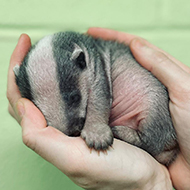
Two-week old Lavender rescued on Valentine’s Day.
The Scottish SPCA is currently caring for a two-week-old badger cub that was found in woodland near Inverness on Valentine’s day.
A member of the public contacted the Scottish SPCA after finding the tiny cub. It is suspected that the female infant was dragged away from her sett by another animal.
The badger, who has been named Lavender, is now being hand-reared by wildlife care assistant April Sorley at the charity's National Wildlife Rescue Centre.
At 12 weeks the cub will be weaned, and then in the autumn she will be released with other badger cubs in the charity’s care.
Ms Sorley said: “We believe Lavender is the youngest badger cub to ever be cared for at our National Wildlife Rescue Centre. When she arrived she was smaller than my hand and weighed just 250g, although she’s getting bigger every day!
“She is bottle feeding well, and has doubled her weight since she arrived which we’re so pleased about. As of today she weighs 575g.
She went on to add that the Scottish SPCA typical sees badgers come into its care around April, when the young are old enough to venture out of their sett and explore their surroundings.
If a member of the public finds a wild animal in need of help, the Scottish SPCA encourages them to contact its animal helpline on 03000 999 999.
Images (c) Scottish SPCA.



 The Animal and Plant Health Agency (APHA) has updated its online reporting service for dead wild birds.
The Animal and Plant Health Agency (APHA) has updated its online reporting service for dead wild birds.